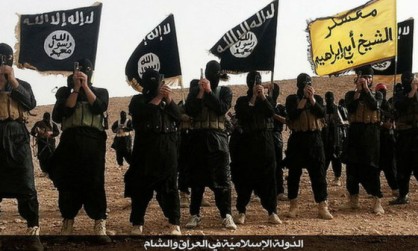
An in-depth financial investigation into ISIS reveals that jihadis earn almost $1billion from looting, oil fields and taxes.
The Jihadist movement makes almost £600million yearly and can fund its campaign of twisted terror activity and bloodshed for years to come, an investigation has found.
ISIS makes close to $1billion each year - predominantly from looting, oil fields and taxes.
Of its income, two-thirds is ploughed right back into its war machine while the rest of its income goes towards the day-to-day running of the territory it holds in Syria and Iraq. Their territory includes major cities Mosul and Raqqa.
The probe into ISIS finances comes as the organisation showed off new rockets and tanks in propaganda images.
The investigation, by the Financial Times, claims ISIS is set up to continue its campaign of terror for three years.

It examines how the terror organisation is ran and how its campaign of bloodshed is funded.
A mother who managed to flee ISIS in her home country of Mosul told how hospitals - which are ran on the Islamic State Health Service, an organisation that advertises itself with the NHS font logo - were packed with terror fighters receiving treatment.
However, as someone who is not loyal to ISIS, she was told to bring her own medicine.
Terrorists willing to fight for ISIS are broken into three 'ranks'.
Munasireen
These fighters have not pledged allegiance to Islamic State, and earn between £33 ($50) to £100 ($150) each month.
Mubayeen
The Mubayeen fighters earn between £130 ($200) and £200 ($300) a month. They have pledged allegiance to Islamic State, and are seen as the mid-ranking fighters.
Muhajireen
On average, the Muhajireen militants are paid £400 ($600) a month. However this can go as high as £650 ($1,000).
Muhajireen fighters are predominantly foreign fighters who may have a military background after serving in neighbouring countries.
However since RAF jets began bombing ISIS targets in Syria, there are reports that fighters have been forced to take a paycut.
Columb Strack, senior analyst at IHS, said: "There are early indications that the group is struggling to balance its budget, with reports of cuts to fighters’ salaries, price hikes on electricity and other basic services, and the introduction of new agricultural taxes.
Although the Islamic State retains its capacity to produce oil, its loss of easy access to Turkey after its defeat in Tal Abyad, and the efforts by Turkish authorities to stop smuggling activities along its border with Syria, have gradually forced the group to rely increasingly on the internal markets in Syria and Iraq to smuggle and sell oil."
"Tax revenues are much harder for the US-led coalition to target without having a substantial negative impact on the civilian population, and would most likely be counterproductive," he added.
No comments:
Post a Comment